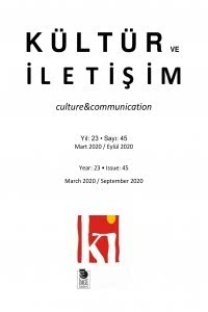Kültürün Metalaşmasında Genel Eğilimler
Bu çalışmanın temel amacı medya tarafından gerçekleştirilen kültürel üretimin, bir meta üretimi olarak çözümlemesini sunmaktır. Bu çerçevede, kültürel ürünlerin özgül doğalarının ve bunların bağlı oldukları üretim süreçlerinin özelinde öcelikle kültürel alan içinde sermaye dolaşımının nasıl gerçekleştiği ve bununla bağlantılı ideolojik süreçlerin bu yapıya nasıl eklemlendikleri vurgulanmıştır. Çalışmanın temel tezi, tekelci kapitalizm aşaması içinde kültürel üretimin maddi üretimle eklemlenmiş olduğudur. Bir diğer anlatımla kültürel ürünler. emekle üretilen, bir değeri olan dolayısı ile de mübadeleye konu olan birer meta konumundalardır . Bu yönüyle de kültürel üretim sermaye birikim yapılarıyla uyumlu olarak kültürün metalaşmasına hizmet etmektedir. Bu çözümleme biçimi çerçevesinde makalede, eleştirel ekonomi politiğin kavramsal araçlarının önemini vurgulanmaktadır.
The Political Economy of Cultural Production
The airn of this paper is to present an analysis of cultural production realised by media as a commodity production. inthis context, by emphasising the special nature of cultural commodities and the production processes, what is examined is, first, the process of circulation of capital which takes place within cultural sector and second, the ideological forms which se~ms to be in a closed determined articulation with the former. The main argument of my thesis is that. in the age of monopoly capitalism, culture should be considered as a part of -or in a close determined articulation with-material production itself. This is to say, the cultural products are produced by labour, they have a value, and subject to exchange relations. in other words, in the present stage of capitalist mode of production, the cultural production increasingly appears in reconciliation with the logic of capital accumulation which in turn serves tor the commodification f culture. in this context, this paper emphasises the importance of the methodology of critical political economy in analysing the issue. Of course the question, "how ideological processes work" is still important. However. in order not to lose critical insight. we must alsa concentrate on the question "why it works" -because the answer given to this question will also explain the need tor a political economy of cultural production.
___
Bagdikian B. (1987). "The 50, 26, 20 ... Corporations That Own Our Media." http://www.fair.orgBagdikian B. (1992). The Media Monopoly. Boston: Beacon Press
Bagdikian B. (1995). "A Few Words With Media Critic Ben Bagdikian: Russel Schoch Converses With Ben Bagdikian." California Monthly (Sept. 1995). http://www.rain.org
Braverman H. (1974). Labour and Monopoly Capital. New York: Monthly Review Press.
Clarke J. (1991 ). New Times and Old Enemies: Essays on Cultural Studies and America. Landon: Harper Collins Academic.
Ewen S.(1976). Captains of Consciousness: Advertising and the Social Roots of Consumer Culture. New York: Mc Graw Hill.
Garnham N. (J 990). Capitalism and Communication: Global Culture and the Economics of /nforrnation. Landon: Sage.
Garnham N. (1997). "Political Economy and The Practice of Cultural Studies." Cultural Studies in Question. M. Ferguson ve P. Golding (der.) içinde. London: Sage.
Goldman R. (1992). Reading Ads Socially. New York: Routledge.
Haraldsen G. (1991). "Cultural lnterpretations of Media Consumption." Media and Communication: Readings in Methodology, History and Cu/ture. Ronning H. and Lundby K. (der.) içinde. Norwegian University Press.
Hirsch P. (1971 ). "Processing Fads and Fashions: AN Organization Set Analysis of Cultural lndustry Systems." American Journal of Sociology (77) 4: 639-659.
IDATE (1996). Annual Sectorial Report: The World and Television Market. http://www.idate.fr (IDATE).
Kaya R. (1994). "A Fait Accompli: Transformation of Media Structures in Turkey." ODTÜ Gelişme Dergisi (21) 3: 383-404
Marx K. (1990). Capital (1 ). London: Penguin.
Marx K. (1993). Grundrisse. London: Penguin.
Mattelart A. (1991). Advertising lnternational: The Privatization of Pub/ic Space. New York: Routledge.
Mosco V. (1966). The Political.Economy of Coriımunication. London: Sage Murdock G. ve Golding P. (1979). "Capitalism Communication and Class Relations." _Mass Communication and Society. Curran J. vd. (der.) içinde. London: Edward Arnold.
Peterson R. A. ve o. G. Berger (1971). "Entrepreneurship in Organizations: Evidence from the Popular Music lndustry." Administrative Science Quarterly {16): 97-106.
Peterson R. A. ve o. G. Berger (1975). "Cycles in Symbolic Production: The Case of Popular Music." American Sociological Review (40): 158-173.
Philips o. ve Tomlinson A. (1992). "Homeward Bound: Leisure, Po~ular Cultu.re and Consumer Capitalism." Come on Down: Popular Medıa Culture ın Post War Britain. Strinati ve Wagg (der.) içinde. London: Routledge.
Tester K. (1994). Media, Culture and Morality. Landon: Routledge.
Thompson J.B.(1994). "Social Theory and The Media." Communication Theory Today. Crowley and Mitchell (der.) içinde. Polity Press.
TUENA (1998a). Türkiye içerik Üretimi Çalışması: Çalışma Belgesi. TUENA-Türkiye Ulusal Enformasyon Altyapısı Proje Ofisi: Ankara.
TUENA (1998b). Enformasyon Teknolojileri Sanayii Y~ten~~ Saptaması Çalışması. TUENA Türkiye Ulusal Enformasyon Altyapısı Proıe Ofısı: Ankara.
Wernick A. (1991). Promotional Culture: Advertising, ldeology and Symbolic Expression. London: Sage.
Williams R. (1992). Marxism and Literature. Oxford: Oxford University Press.
- ISSN: 1301-7241
- Yayın Aralığı: Yılda 2 Sayı
- Başlangıç: 1998
- Yayıncı: İmge Kitabevi Yayınları
Sayıdaki Diğer Makaleler
Türkiye' de İletişim Eğitimi Üzerine Öneriler
Yayıncılık Eğitimi Türk ve Amerikalı Yayıncılık Öğrencileri Arasında Karşılaştırmalı Bir Çalışma
Önemli Bir Dönemece Yaklaşırken: ki Bir Yılını Dolduruyor
Mahremin Müzakereye Çağrılması ve Yıldo Örneği: Mahrem Alandan Pop-Mahrem Alana
F.mutlu BİNARK, Peyami ÇELİKCAN
Üniversite-Sanayi İşbirliği Programı Üzerine Bir Eleştiri
Kültürün Metalaşmasında Genel Eğilimler
